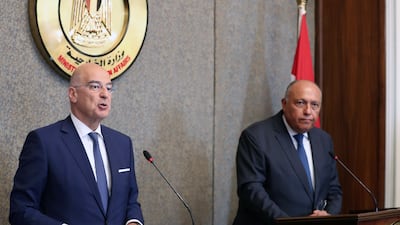Close allies Egypt and Greece on Sunday strongly condemned disputed maritime and gas deals between Turkey and Libya's Tripoli-based government, one of two rival administrations in the North African nation.
"Turkey seeks once again to take advantage of the turbulent situation in Libya in order to further destabilise the Mediterranean region and establish regional hegemony,” Greek Foreign Minister Nikos Dendias told reporters in Cairo after talks with his Egyptian counterpart, Sameh Shoukry.
“I was glad to see that all key stake holders as well as the European Union have publicly denounced those plans. No one can build new facts on the bases of illegal and illegitimate actions, no one can ignore geography, no one can create a virtual world," he said.
Cairo and Athens have in recent years strengthened ties, co-operating closely to develop energy resources in the eastern Mediterranean, sharing intelligence on terrorism and frequently conducting joint war games.
Egypt and Greece, along with Cyprus — another regional foe of Turkey — have signed maritime border agreements with the aim of facilitating the exploitation of large natural gas fields in the eastern Mediterranean.
Nato-member Turkey has for years been seeking to muscle in on efforts led by its three rivals and Israel to turn the region into an energy hub. Ankara has earned stern rebukes from the United States and the EU for engaging in illegal gas exploration in Cyprus’s exclusive economic zone.

Mr Dendias said his talks with Mr Shoukry focused on the memoranda of understanding signed last week between Turkey and Abdul Hamid Dbeibah, the leader of the Tripoli-based government.
The agreements include the joint exploration of hydrocarbon reserves in Libya’s offshore waters and on its territory.
Mr Dendias said the agreements were a threat to regional stability and infringed on Greek waters.
He noted that "the mandate of the Tripoli government has expired, and if I may say so, long ago. So it does not, I repeat it does not, represent the Libyan people".
The Egyptian foreign minister echoed his Greek counterpart's view, saying Mr Dbeibah's government had no authority to conclude such deals, given that its mandate expired following Libya's failure to hold nationwide elections in December.
He called on the UN to take a clear position on the legitimacy of the Dbeibah government, saying the international body should not stay silent.
Egypt and Turkey have been at odds since the Egyptian military in 2013 removed an Islamist president backed by Ankara amid mass protests against his divisive one-year rule.
The two regional heavyweights have held at least two rounds of exploratory talks to find ways to improve relations but made no tangible headway.

In contrast, Turkey and fellow Nato member Greece have been bitter rivals for two centuries. At present, they are at odds over territorial rights in the Aegean Sea, the rights of the small Turkish-speaking minority in Greece, and more recently their maritime borders in the Mediterranean.
Cyprus is also a major source of tension between the two neighbours.
Turkey, Greece’s former colonial master, invaded Cyprus in 1974 after the leaders of a coup there backed by the junta ruling in Athens at the time sought union with Greece. Turkey continues to occupy a third of the island, where Greeks have traditionally been the majority.


